Article content
Russia’s invasion of Ukraine has sparked unprecedented economic and financial retaliation from western nations which are piling on sanctions in what France has called “all-out economic and financial war.”
Check here for the latest news
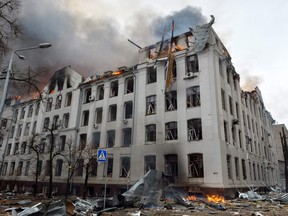
Russia’s invasion of Ukraine has sparked unprecedented economic and financial retaliation from western nations which are piling on sanctions in what France has called “all-out economic and financial war.”
But the conflict will have consequences for the whole world as it cuts off crucial energy and crop supplies, disrupts businesses and upsets financial markets, already under extreme stress as central banks prepare to tighten.
There is a lot going on out there so check here for the latest news on how the conflict is affecting markets, businesses and the economy.
Russia’s wealthy are putting their money into luxury jewelry and watches to preserve the value of their savings as sanctions hit, reports Bloomberg.
Sales in Bulgari SpA’s Russian stores have risen in the last few days, the Italian jeweller’s chief executive officer said, after the international response to the nation’s invasion of Ukraine severely restricted the movement of cash.
“In the short term it has probably boosted the business,” Jean-Christophe Babin said in an interview with Bloomberg, describing Bulgari’s jewelry as a “safe investment.”
“How long it will last it is difficult to say, because indeed with the SWIFT measures, fully implemented, it might make it difficult if not impossible to export to Russia,” he said, referring to restrictions on Russian access to the SWIFT financial-messaging system.
Even as consumer brands from Apple Inc. to Nike Inc. and energy giants BP Plc, Shell Plc and Exxon Mobil Corp. pull out of Russia, Europe’s biggest luxury brands are, so far, trying to continue operating in the country.
— Bloomberg
Swedish fashion group H&M is temporarily pausing all sales in Russia, it said on Wednesday, joining a growing list of companies shunning the country since it invaded Ukraine.
The world’s second-biggest fashion retailer said it was deeply concerned about the tragic developments in Ukraine and “stand with all the people who are suffering.”
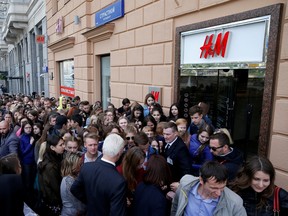
Russia was H&M’s sixth biggest market with four per cent of group sales in the fourth quarter of 2021. While it has been reducing the number of physical stores in many markets, it has been increasing store count in Russia.
“H&M Group has decided to temporarily pause all sales in Russia,” the company, whose biggest rival is Inditex, said in a statement.
— Reuters

Russian businessman Roman Abramovich has decided to sell Chelsea Football Club, 19 years after buying the London side, and promised to donate money from the sale to help victims of the war in Ukraine.
“I have always taken decisions with the club’s best interest at heart,” Abramovich said in statement published by the reigning European and world soccer champions on their website.
“In the current situation, I have therefore taken the decision to sell the club, as I believe this is in the best interest of the club, the fans, the employees, as well as the club’s sponsors and partners.”
Abramovich said he would not ask for loans he has made to the club — reported to total 1.5 billion pounds (US$2.0 billion) — to be repaid to him and the sale would not be fast-tracked.
He said he had told his aides to set up a charitable foundation which would receive all net proceeds from the sale.
“The foundation will be for the benefit of all victims of the war in Ukraine,” Abramovich said in the statement.
“This includes providing critical funds towards the urgent and immediate needs of victims, as well as supporting the long-term work of recovery.”
— Reuters
The surge of Russians buying cryptocurrencies amid a tumbling ruble has one analyst calling it a moment of crypto returning to its roots.
“Russians buying crypto actually represents a use case of the sort for which crypto was intended,” said George Monaghan, thematic analyst at analytics firm GlobalData, in a report. “Crypto, being decentralized, is less vulnerable to government regulations than FIAT currencies. Sanctions have excluded some Russian banks from SWIFT and Mastercard and VISA have frozen their operations in Russia, but it seems that Russians can still make crypto transactions.”
Monaghan added that while the Russian government refused to open the Moscow exchange, Russians are still able to trade in crypto assets. The Russian government won’t be able to move day-to-day operations into crypto, but it has given citizens a way to preserve some of their wealth, Monaghan noted.
“This activity reminds us what crypto was really meant to be, before the hype and the memecoins and the gains: decentralized and unregulated,” he wrote.
GlobalData made it clear that Russians were not piling into the space because it looked promising or had strong prospects for growth, but because it was more stable compared to the ruble.
The amount traded from the rouble into cryptocurrencies have doubled since the beginning of the Russian invasion into the Ukraine and reached US$60 million a day on Monday, according to data from crypto analytics firm Chainalysis.
— Stephanie Hughes
A broad range of companies, from energy giant BP Plc to Apple Inc. to the world’s largest banks are pulling up stakes and cutting ties with Russia after its attack on Ukraine, leaving billions of dollars in business behind.
The departures come as Western countries, including Canada, the U.S. and much of Europe, have imposed harsh sanctions on Russia in a bid to constrict its economy and compel it to end the invasion.
But at least one Canadian company, Toronto-headquartered Kinross Gold Corp., which operates a high-grade underground mine in the far east of Russia, has abstained from criticizing Russia and indicated it plans to continue operating there as long as possible.
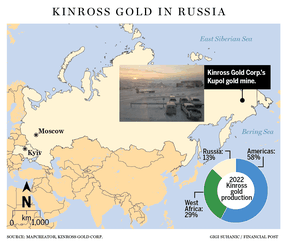
Gold recently pierced a one-year high, reaching US$1,930 per ounce, up eight per cent in the past 30 days, a surge most attribute to the increase in geopolitical tensions as a result of the invasion.
Kinross chief executive J. Paul Rollinson told analysts during the company’s fourth quarter earnings call on Feb. 18, as Russian troops were gathering on the border of Ukraine but had not yet invaded, that the company’s Kupol mine had all the supplies and workforce it needs to continue operating.
“All I can say is we’ve operated there successfully for many years with strong support from the Russian government,” Rollinson said, adding. “We’re good in our communities. We pay our taxes. And we think we’re quite welcome there, and it’s been a great place for us.”
Keep reading the story from the Financial Post’s Gabriel Friedman.
The Bank of Canada raised interest rates by 25 basis points to 0.50 per cent this morning, citing high inflation as one of the main factors behind its decision.
Prices were already rising, but the conflict in Ukraine is adding to inflationary pressures, policy makers said in today’s statement. The bank now expects inflation rates, now at 5.1 per cent, to stay higher for longer.
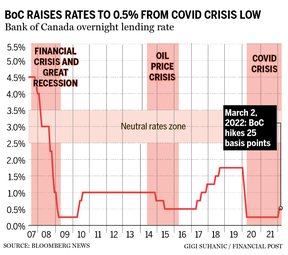
“Price increases have become more pervasive, and measures of core inflation have all risen. Poor harvests and higher transportation costs have pushed up food prices. The invasion of Ukraine is putting further upward pressure on prices for both energy and food-related commodities. All told, inflation is now expected to be higher in the near term than projected in January,” the statement said.
The bank reiterated its commitment to using its policy tools to bring the inflation rate back down to its 2 per cent target.
— Victoria Wells
Hockey equipment company Canada Cycle and Motor Company Limited (CCM) will drop Alex Ovechkin and other Russian hockey players in their global marketing campaigns.
“Although Mr. Ovechkin is not responsible for the Russian government’s actions, we took the decision to not use him (or any Russian player) on any global CCM communication at this point,” CCM chief executive Marrouane Nabih wrote to TSN in an email.
In the past, Ovechkin has been a vocal supporter of Russian president Vladimir Putin. In 2017, he started a social movement called “PutinTeam.”
— Marisa Coulton
The list of companies exiting or refusing to do business with Russia grows.
Boeing has suspended technical support for Russian airlines and Apple Inc has stopped selling iPhones and other products in Russia.
U.S. energy firm Exxon Mobil said it would exit Russia
North American stocks open higher after a rough week so far as Federal Reserve Chair Jerome Powell signaled the central bank would start raising rates this month despite uncertainties stemming from the Ukraine crisis.
The Dow Jones Industrial Average rose 84.56 points, or 0.25 per cent, at the open to 33,379.51.
The S&P 500 opened higher by 16.30 points, or 0.38 per cent, at 4,322.56, while the Nasdaq Composite gained 65.07 points, or 0.48 per cent, to 13,597.53 at the opening bell.
The Toronto Stock Exchange’s S&P/TSX composite index was up 117.07 points, or 0.56 per cent, at 21,121.58.
Whoa, oil prices are getting crazy.
Brent crude spiked higher this morning touching $113.02 – its highest since 2014 — and U.S. crude came close to passing its 2013 peak as traders scrambled to find alternatives to Russian oil in an already tight market.
But according to some economists, it’s possible we ain’t seen nothing yet.
If the conflict escalates and Russian exports are choked off altogether, oil could rise to a range of US$120 to US$140, says Capital Economics.
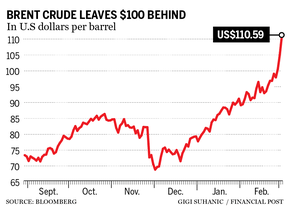
Capital also had a few thoughts on gold, which it expects will climb higher in coming weeks and months because of safe-haven demand. It forecasts that gold will remain firmly above US$2,000 an ounce in the first half of this year, but if there is an escalation in the conflict the yellow metal could soar to US$2,500.
Gold was down this morning, pressured by a higher U.S. dollar and yields, at US$1,924.00 per ounce.
Additional reporting by Reuters and Bloomberg


German politicians and business leaders, despairing a weak economy, are lately broaching a once taboo topic: claiming their compatriots don’t work enough. They may have a point.
German Finance Minister Christian Lindner fired the latest salvo in this fractious debate last week when he said that “in Italy, France and elsewhere they work a lot more than we do.” Economy Minister Robert Habeck, a Green Party representative, grumbled in March about workers striking, something a country beset by labor shortages “cannot afford.” (Later that month train drivers secured a 35-hour workweek instead of 38, for the same pay.) Signaling his opposition to a four-day work week, Deutsche Bank AG Chief Executive Officer Christian Sewing in January urged Germans “to work more and work harder.”
Canada stands to bear a greater economic burden than the United States if Donald Trump wins the upcoming presidential election and imposes promised tax cuts and tariffs on all U.S. imports, a new report warns.
The analysis released Tuesday by Scotiabank Economics says if Trump returns to the White House and follows through on his vow to slap a 10-per cent tariff on all imported goods — with the exception of China, which would face a 60-per cent carve-out on its U.S. exports — and countries retaliate with their own, there would be “substantial negative impacts” on the U.S. economy. GDP would likely fall by more than two per cent by 2027 relative to current forecasts, while inflation would rise 1.5 per cent, leading to a two per cent interest rate hike.
In Canada, the economic impact would be even more stark with an expected GDP drop of 3.6 per cent, given its reliance on trade with the U.S. Inflation and interest rates would also be pushed up for the next two years — 1.7 per cent and 190 basis points, respectively — the report suggests.
“What Trump is looking to do is much broader, and much more concerning, than the tariffs he imposed during his first term,” said Scotiabank’s chief economist Jean-François Perrault, who authored the report.
The report also serves as another reminder that Canada needs to urgently address its issues with lagging productivity, warning the problem makes Canada more vulnerable to economic shocks brought by trade policy changes in the U.S. and abroad.
Perrault says it’s far too late to fix the problem in time for the U.S. election in November.
“It takes a long time to change direction on productivity,” he said in an interview. “Maybe you can make up some ground over the next few quarters, but we need massive amounts of progress to get to where we need to be (to withstand U.S. economic shocks).”
Although the analysis examined the impact of policies proposed by both Trump and U.S. President Joe Biden, it focuses more on the fallout from Trump’s promises.
That’s because they’re not only more potentially harmful, Perrault said, but also because they’re more likely to be implemented than Biden’s vow to raise the corporate tax rate.
“There’s really no appetite in the U.S. right now for any kind of tax hike,” Perrault said.
Implementing a change to the corporate tax rate would require Biden’s Democrat party to control both chambers of Congress — a scenario seen as highly unlikely, given recent polling. Trump’s proposals, meanwhile, are seen as more likely to be implemented quickly and without congressional approval, particularly his expanded tariffs.
During his presidency, Trump imposed tariffs on about US$50 billion worth of Chinese goods imported to the U.S., later expanding to another US$300 billion, sparking a trade war with China. Many of those tariffs have remained in place under the Biden administration.
Trump also slapped tariffs up to 25 per cent on imported washing machines, solar panels, steel and aluminum in 2018. Canada and Mexico were later exempted from the steel and aluminum tariffs in 2019, although the Canadian aluminum tariff was briefly reintroduced in 2020.
U.S. government data shows those tariffs — none of which were legislated or approved by Congress — have cost American manufacturers more than US$230 billion as of March 2024 and have shrunk the U.S. economy by 0.3 per cent.
Trump has repeatedly claimed tariffs serve to punish unfair trade practices from other countries, despite agreement among economists that they raise prices for American consumers, and says he wants to expand them to 10 per cent on all imported goods from every country if he wins in November. He has also said he will seek a 100 per cent tariff on imported cars, and carve out a 60 per cent tariff for Chinese imports specifically.
The most likely scenario — a continuation of Trump’s 2017 tax cuts beyond their 2025 expiration combined with across-the-board tariffs — would see Canada’s GDP stay three per cent lower long-term, and just over one-per cent lower in the U.S.
The Scotiabank report says the economic harm from the tariffs can be reduced on both sides of the Canada-U.S. border if Canada and Mexico negotiate an exemption with the U.S. under the Canada-United States-Mexico Agreement (CUSMA), which replaced the North American Free Trade Agreement (NAFTA) during the Trump administration.
Scotiabank predicts in that scenario, Canada’s GDP would only fall by 1.4 per cent in the short term — half the drop forecast without an exemption — and 0.3 per cent in the long term, while U.S. GDP would fall 1.7 per cent and 1.2 per cent, respectively.
Perrault says he’s “hopeful” such a carve-out could be negotiated, even though Trump would likely insist on further concessions that benefit U.S. trade. That “bigger stick” approach could be somewhat limited compared to the contentious CUSMA negotiations, however.
“Trump owns CUSMA, so he wouldn’t be in as much of a position to throw it away,” he said. “So maybe we get a little bit of a break.”
The report also examines the impact of Trump’s repeated vow to mass deport roughly 10 million undocumented immigrants living illegally in the U.S., which Perrault admits would be “politically and logistically infeasible.” It would also be economically harmful, the analysis found, permanently reducing both U.S. employment and GDP by three per cent, though the impact on Canada would be negligible.
The analysis says Canada and the U.S. could see additional economic impacts due to a number of scenarios it didn’t explore, including China retaliating to tariffs by unloading its U.S. Treasury holdings; further debt ceiling and budgetary crises in the U.S.; Trump’s appeasement of aggressive foreign adversaries like Russia and China; and domestic civil disorder regardless of who wins the U.S. elections.
Perrault said the findings also underscore the key difference between Trump and Biden as Canadian trade partners.
“Biden seems to view negotiations from a collaborative approach: how can everyone come away with a win?” he said. “Trump doesn’t see it that way. He’s very much in the mindset of, ‘How will this benefit me?’”
More on Money
© 2024 Global News, a division of Corus Entertainment Inc.


More than six months into the devastating Gaza war, its impact on the Israeli and Palestinian economies has been huge.
Nearly all economic activity in Gaza has been wiped out and the World Bank says the war has also hit Palestinian businesses in the occupied West Bank hard.
As Israelis mark the Jewish festival of Passover, the much-vaunted “start-up nation” is also trying to remain an attractive proposition for investors.
The cobbled streets of Jerusalem’s Old City are eerily quiet. There are none of the long queues to visit the holy sites – at least those that remain open.
Just after Easter and Ramadan and right in the middle of Passover, all four quarters of the Old City should be teeming with visitors.
Just 68,000 tourists arrived in Israel in February, according to the country’s Central Bureau of Statistics. That’s down massively from 319,100 visitors in the same month last year.
While it may be surprising that any visitors pass through Jerusalem at a time of such tension, many of those who do are religious pilgrims from across the globe who will have paid for their journeys well in advance.
Zak’s Jerusalem Gifts was one of only a handful of stores on Christian Quarter Street in the Old City, which is situated in occupied East Jerusalem, to have bothered opening up on the day I passed by.
“We’re only really doing online sales,” says Zak, whose business specialises in antiques and biblical coins.
“There are no actual people. The last week, after the Iran-Israel escalation, business dropped down again. So we are just hoping that after the holidays some big major miracle will happen.”
It’s not just in Jerusalem’s Old City that they need a miracle.
Some 250km (150 miles) further north, on Israel’s volatile border with Lebanon, almost daily exchanges of fire with Hezbollah since the war in Gaza began have forced the Israeli army to close much of the area and 80,000 residents have been evacuated further south. A similar number of Lebanese have been forced to leave their homes on the other side of the border.
Agriculture in this part of Israel is another economic sector that has been hit hard.
Ofer “Poshko” Moskovitz isn’t really permitted to enter his avocado orchard in the kibbutz of Misgav Am because of its proximity to the border. But he occasionally ventures in anyway, walking wistfully among the trees, to gaze at all of his “money falling on the ground”.
“I must go to pick in the orchard because it’s very important for the next season,” Poshko says. “If I don’t pick this fruit, the next season will be a very poor one.”
He says he is losing a lot of money because he can’t pick the avocados – around 2m shekels ($530,000; £430,000) this season, he says.
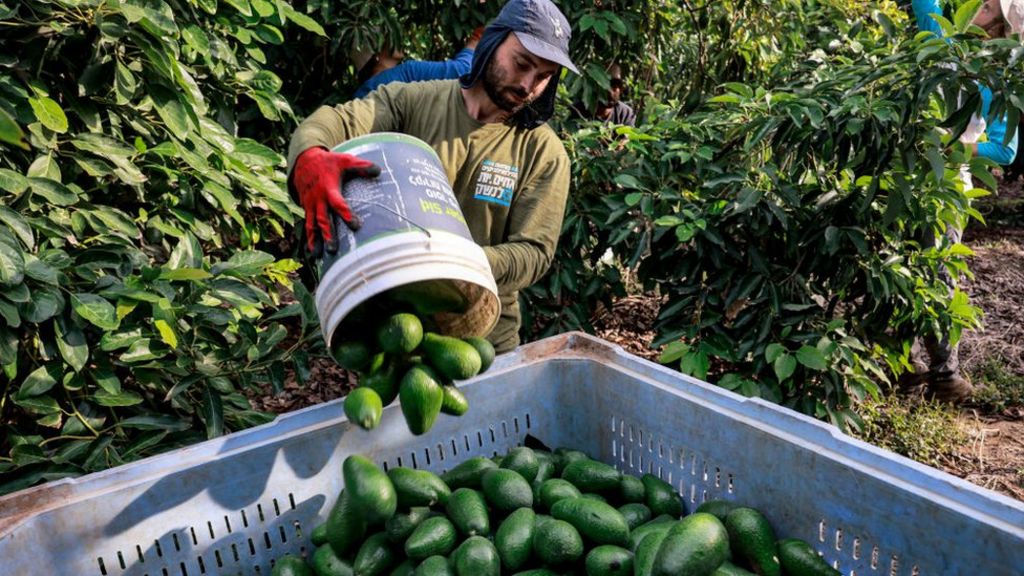

Although they provide a living for thousands of people, agriculture and tourism account for relatively small parts of both the Israeli or Palestinian economies.
So what does the wider picture show?
Last week ratings agency S&P Global cut Israel’s long-term ratings (to A-plus from AA-minus) reflecting a loss of market confidence after increased tensions between Israel and Iran and concerns the war in Gaza could spread across the wider Middle East.
That loss of confidence was also reflected in falling Israeli GDP – the total value of goods and services produced in the economy – which decreased by 5.7% in the last quarter of 2023. Many Israelis though say the country’s renowned high-tech and start-up sector is proving to be more “war-proof” than expected.
The coastal city of Tel Aviv is only 54km from Jerusalem. More pertinently, perhaps, it’s less than 70km from Gaza.
At times, you’d be forgiven for forgetting – however momentarily – that Israel is embroiled in its longest war since independence in 1948.
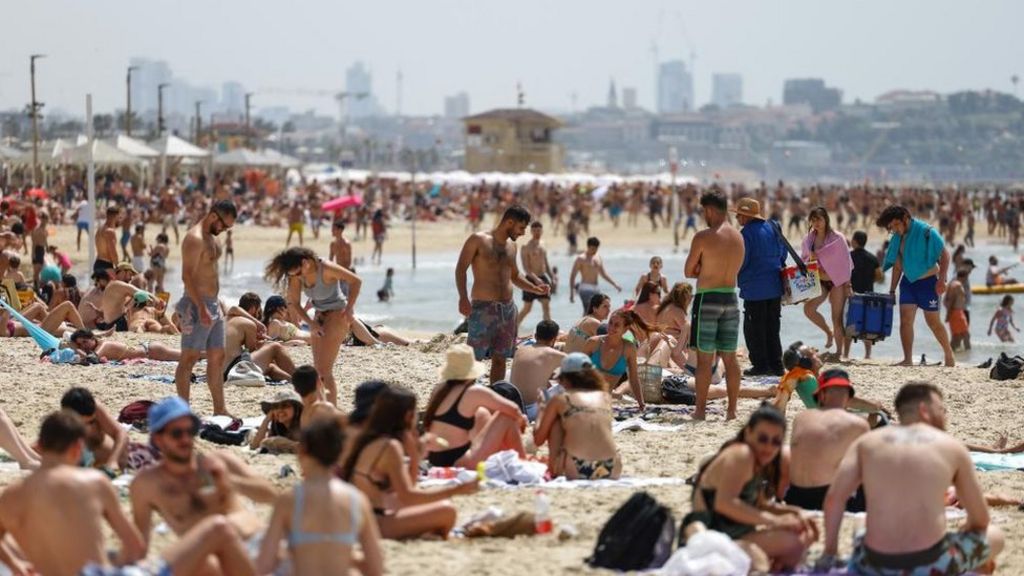

Families make the most of the early summer sun to play in the surf, couples eat lunch in the many open-air beach restaurants and young people strum away on guitars on the green spaces between the coastal road and the Mediterranean.
The backdrop is a city that is economically active and physically growing fast.
“They joke that Israel’s national bird should be the crane – the mechanical kind!” says Jon Medved, founder and CEO of the online global venture investment platform Our Crowd.
An engaging character with an overwhelmingly upbeat view of his world, Medved tells me that, “in the first quarter of this year, almost $2bn was invested in Israeli start-ups… We’re having one of the best years we’ve ever had. People who are engaged with Israel are not disengaging.”
Medved insists that, despite everything, Israel is still the “start-up nation” and a good option for would-be investors.
“There are 400 multinational corporations that have operations here. Not a single multinational, has closed its operation in Israel since the war.”
To an extent, Elise Brezis agrees with Mr Medved’s assessment.
The economics professor at Bar-Ilan University near Tel Aviv acknowledges that despite the last quarter’s GDP figures, Israel’s economy remains “remarkably resilient”.
“When it comes to tourism, yes, we have a reduction in exports. But we had also reduction in imports,” says Brezis. “So in fact, the balance of payments is still okay. That’s what is so problematic is that from the data, you don’t really feel that there is such a terrible situation in Israel.”
But Prof Brezis detects a wider malaise in Israeli society that isn’t reflected in economic data.
“Israel’s economy might be robust, but Israeli society is not robust right now. It’s like looking at a person and saying, ‘Wow, his salary is high,’ […] but in fact he’s depressed. And he’s thinking, ‘What will I do with my life?’ – That’s exactly Israel today.”
If the outlook in Israel is mixed, then across the separation barrier that divides Jerusalem and Bethlehem the view from the Palestinian side is overwhelmingly bleak.
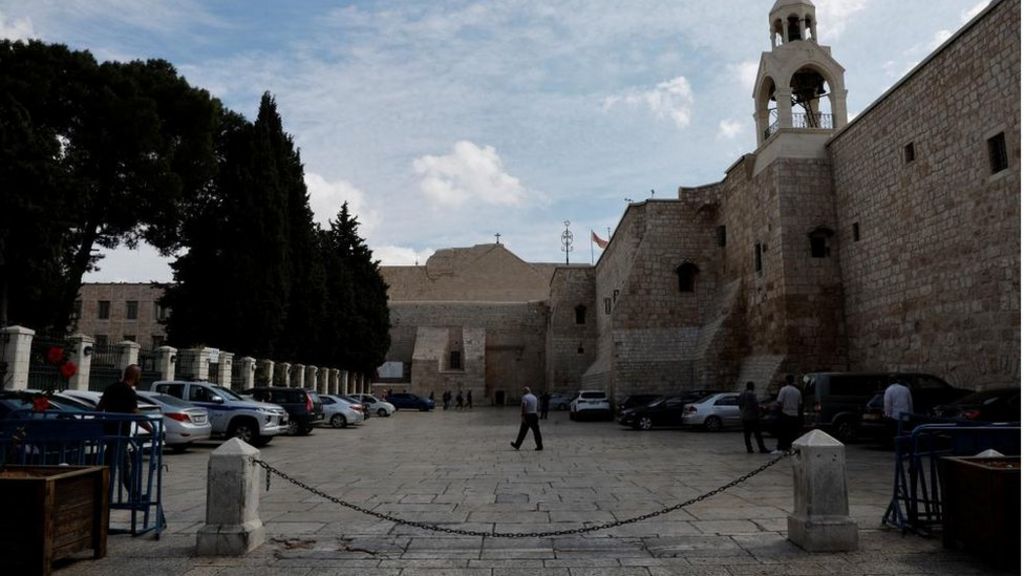

Tourism is especially important to the economies of towns like Bethlehem in the occupied West Bank.
While some people are still heading to Jerusalem’s sites, in the place where Christians believe Jesus was born tourism “stopped immediately” after 7 October last year, says Dr Samir Hazboun, chairman of Bethlehem’s Chamber of Commerce and Industry.
That’s when Hamas attacked Israeli communities near Gaza, killing about 1,200 people, mainly civilians, taking about 250 hostages and sparking the current war.
There’s huge dependence and reliance on Israel’s economy here – but Israel virtually closed off the landlocked West Bank after 7 October and this has had a disastrous impact on the life and work of many Palestinians, Dr Hazboun says.
“The Bethlehem governorate right now is closed,” he says. “There are around 43 gates [in the Israeli security barrier] but only three are open. So with between 16,000 and 20,000 Palestinian workers from our area working in Israel, immediately, they lost their income.”
The chamber of commerce says that the revenues from local Palestinians working in Israel amounted to 22bn shekels ($5.8bn) annually.
“You can imagine the impact on the economy,” says Dr Hazboun, who is particularly concerned for the prospects for younger Palestinians the longer the war continues and more the Israeli and West Bank economies decouple.
“The younger generation now are jobless, they are not working. Many of them are talented people,” he laments.
“In June I’m expecting around 30,000 new graduates from the Palestinian universities. What they will do?
In Gaza itself the economy has been completely destroyed by six months of war. Israel’s relentless aerial bombardment and ground operations have killed 34,183 people, mostly women and children, according to the Hamas-run health ministry.
Unlike in some parts of Israel, where there is optimism around being able to ride out the storm and continue attracting investors, in the West Bank and Gaza there is little hope things will return to any kind of normal.




Opinion: Fear the politicization of pensions, no matter the politician




Pecker’s Trump Trial Testimony Is a Lesson in Power Politics




NASA Celebrates As 1977’s Voyager 1 Phones Home At Last
B.C. online harms bill on hold after deal with social media firms
B.C. puts online harms bill on hold after agreement with social media companies
Oil Firms Doubtful Trans Mountain Pipeline Will Start Full Service by May 1st
FLAGSHIP COMMUNITIES REAL ESTATE INVESTMENT TRUST ANNOUNCES CLOSING OF APPROXIMATELY US
Judge Approves $418 Million Settlement That Will Change Real Estate Commissions


